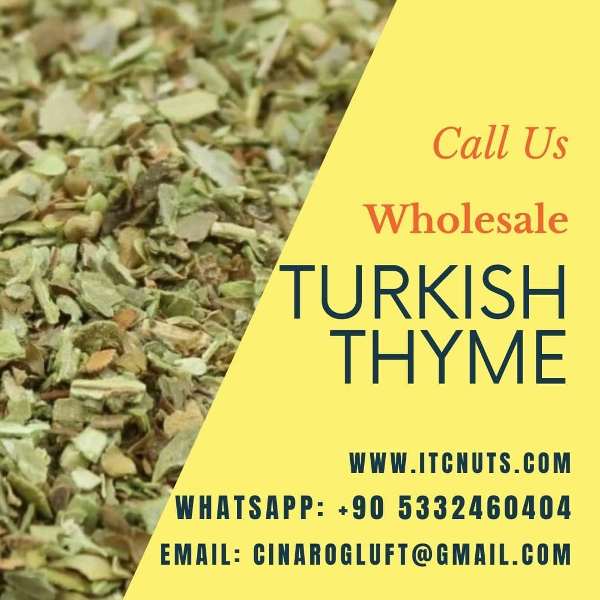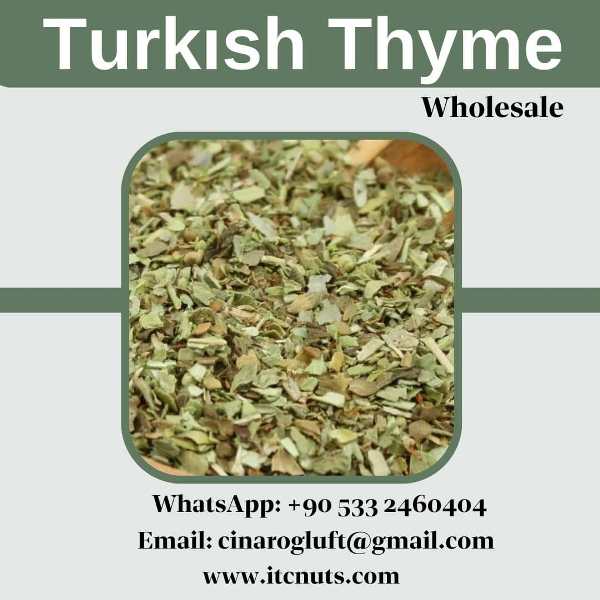Turkish Thyme: A Flavorful Delight for Culinary Creations
We are a Turkish thyme wholesaler and exporter company in Turkey. Our products are high quality and good prices. Please feel free to contact us for more details.
ITC NUTS COMPANY
WhatsApp: +90 533 2460404
Email: cinarogluft@gmail.com

Turkish thyme, with its delightful aroma and unique taste, is a sought-after herb in the culinary world. As a reputable wholesaler of thyme flowers, thyme plugs, and various thyme products from Turkey, we take pride in offering high-quality thyme that enhances the flavors of dishes and adds a touch of Mediterranean charm to every meal. In this article, we will explore the versatility of Turkish thyme, its use in cooking, and the benefits of sourcing thyme wholesale from Turkey.
Turkish Thyme: A Blossoming Wholesale Option

As a wholesaler, sourcing thyme flowers from Turkey opens up a world of culinary possibilities. Turkish thyme, scientifically known as Thymus vulgaris, boasts a distinct and potent flavor that enriches various cuisines. The thyme flowers are known for their concentrated taste and delightful aroma, making them a valuable addition to any culinary repertoire.
Can You Use Thyme Flowers in Cooking?
Absolutely! Thyme flowers are not only edible but also a fantastic addition to cooking. They possess the same robust flavor as thyme leaves and can be used in various dishes. Sprinkling thyme flowers over salads, soups, stews, roasted vegetables, and grilled meats can elevate the taste and aesthetic appeal of your culinary creations. The vibrant purple and white hues of the flowers add a touch of visual delight to your dishes, making them a favorite among creative chefs and home cooks alike.
Thyme Plugs Wholesale: A Convenient Choice
Thyme plugs, which are young thyme plants, are an excellent option for wholesale buyers. These healthy and well-rooted plugs offer convenience and ease of cultivation. Whether you are a restaurateur, a garden center owner, or a culinary enthusiast, thyme plugs wholesale from Turkey provide a cost-effective and efficient way to grow your own fresh thyme.
Turkish Thyme Wholesale: Superior Quality for Your Business
Turkey is renowned for its exceptional thyme production, and sourcing Turkish thyme wholesale ensures that you receive premium quality thyme for your business. With its ideal growing conditions, including warm and sunny climates with well-drained soil, Turkish thyme attains its full aromatic potential, making it highly valued in the global market.
Turkish Thyme Wholesale in the USA: Bringing the Mediterranean to Your Table
As a wholesaler based in Turkey, we offer the convenience of providing Turkish thyme wholesale to customers in the USA. Experience the essence of the Mediterranean in your culinary creations with our fresh and aromatic thyme. From top-tier restaurants to home kitchens, our Turkish thyme will delight your taste buds and elevate your dishes to new heights.
Turkish Thyme Plant: Your Key to a Thriving Herb Garden
For those with green thumbs and a love for gardening, the Turkish thyme plant is a must-have addition to your herb garden. Easy to grow and maintain, Turkish thyme rewards you with an abundance of flavorful leaves and delightful flowers. Its resilience and adaptability to various growing conditions make it a perfect choice for herb enthusiasts of all levels.
Turkish Thyme Salad: A Refreshing Twist to Your Greens
In Turkey, thyme is not limited to the realm of savory dishes; it also shines in delightful salads. A Turkish thyme salad is a refreshing combination of fresh thyme leaves, crisp vegetables, zesty citrus, and tangy dressing. This vibrant salad celebrates the essence of the Mediterranean and adds a burst of flavor to any meal.
Turkish thyme is a culinary treasure that adds a distinct taste and aroma to a wide range of dishes. Whether you choose to use thyme flowers in cooking, source thyme plugs wholesale for gardening, or opt for Turkish thyme wholesale in the USA, you are sure to experience the exceptional quality and versatility that Turkish thyme offers. Embrace the essence of the Mediterranean in your culinary endeavors with Turkish thyme and elevate your dishes to new heights of flavor and delight.
Why Thyme is Very Important Herb Fro Mediterranean People?
Thyme, a perennial herb with a history dating back thousands of years, is an indispensable ingredient in Mediterranean cuisine and is renowned for its medicinal properties. In this comprehensive guide, we will explore the wonders of thyme, its various types, the benefits it offers to health, and its culinary uses. As a wholesaler and exporter of dried thyme from Turkey, you’ll gain valuable insights into this versatile herb and its potential in your business.
What is Turkish Thyme?
Turkish Thyme, scientifically known as Thymus vulgaris and belonging to the Ballıbabagiller family, is a hardy Mediterranean herb with woody stems and fibrous roots. Its small, oval, and gray-green leaves boast a unique taste and smell that makes it a popular spice in various cuisines. From ancient civilizations like the Egyptians to modern times, thyme has been cherished not only for culinary purposes but also for its medicinal and ornamental uses.
Where Does Thyme Grow?
Originally hailing from the Mediterranean region, thyme is now cultivated in various parts of the world. It thrives best in warm and sunny climates with well-drained soil, ideally sandy or stony. Thyme is typically planted in spring and can be harvested multiple times within a year. However, for essential oil production, harvesting during mid-flowering in summer is optimal.
What Are the Types of Thyme?
With over 350 varieties of thyme in the Thymus genus, several types are widely used for culinary and medicinal purposes. Some of the common types include:
Thyme: Also known as garden thyme, it is native to the Mediterranean and boasts a sharp and pleasant aroma reminiscent of clover. Its leaves, flowers, and oil are used both in the kitchen and for medicinal purposes.
Lemon Thyme: This variety stands out with its strong lemon flavor and golden, variegated leaves. It is a favorite food source for bees and butterflies.
Wild Thyme: Native to the Baltic Sea area, wild thyme features stemless leaves and purple or white flowers. It blooms in July and August and grows between 5-15 cm tall. Wild thyme teas have benefits against stomach and digestive problems.
Izmir Thyme: Also known as ball thyme, cheese thyme, moth thyme, or stone thyme, Izmir thyme is widely exported and predominantly used in pharmacy.
Istanbul Thyme: Popularly known as black thyme, Istanbul thyme finds usage in spice-making and tea preparation. It also helps deter insects from plants.
Buckle Thyme: Thriving in Sutculer, Isparta, this thyme variety, also called Sütçüler thyme, is exported to various countries, including Europe, India, the USA, and Canada.
White Thyme (Alanya thyme): Known as Alanya thyme, it contains carvacrol, a substance used in the treatment of lung cancer. It is commonly consumed in oil form.
Mountain Thyme: Also referred to as Syrian thyme, it grows naturally in mountainous and rocky areas. Apart from culinary uses, it is popularly consumed as a tea.
What are the Benefits of Turkish Thyme?
Thyme boasts a plethora of health benefits, making it a valuable addition to our daily lives. Some of the advantages include:
Menstrual Pain Relief: Thyme helps alleviate menstrual pain and provides relief for irregular menstrual problems.
Liver Function Improvement: It aids in improving liver functions.
Cough Soother: Thyme tea effectively soothes coughs and throat irritations.
Calming Effect: Thyme creates a calming effect and helps reduce stress and anxiety.
Antiviral Properties: It acts as a shield against viruses, including hepatitis, shingles, and HPV.
Digestive System Support: Thyme has positive effects on intestinal health, promoting a healthy digestive system.
Immune System Boost: It contributes to bolstering the immune system.
Heart Health: Thyme helps regulate heart rhythm and contributes to overall heart health.
Anemia Prevention: Regular consumption of thyme aids in preventing anemia.
Weight Management: It facilitates fat burning and can aid in weight management.
Blood Pressure Regulation: Thyme has shown potential in lowering blood pressure.
Appetite Stimulation: Thyme possesses appetizing properties, stimulating the appetite.
Oral Health: Regular use of thyme can improve gum health and alleviate gum problems.
Respiratory Health: It is used in the treatment of bronchitis and respiratory issues.
Energy Booster: Thyme is known to provide energy and strength.
Anti-inflammatory: Applying thyme oil to areas affected by rheumatism can provide relief.
Thyme for Skin Health
Thyme is not only valuable in the culinary and medicinal realms but also holds benefits for skin health. Rich in antioxidants and anti-aging properties, thyme water can be applied to the skin for acne prevention, reducing fatigue, brightening the skin, and combating wrinkles. Here’s how you can make a natural thyme tonic:
Boil 2 tablespoons of thyme thoroughly in 2 liters of water.
Allow the water to cool down.
Strain the mixture and store it in a suitable bottle in a cool place.
Consume the tonic within a week.
Thyme tonic helps cleanse the skin, and remove makeup residues, excess dirt, and oil, providing a refreshing and healthy glow when applied before bedtime.
How to Use Turkish Thyme?
Thyme offers a wide array of applications in medicine, food, and cosmetics. It can be used in both dried and fresh forms, such as thyme oil or thyme tea. When using thyme for tea, allow the boiling water to cool for 5 minutes before adding thyme to preserve its nutritional value. In culinary arts, thyme finds its way into meat dishes, vegetable dishes, salads, and various other preparations, adding a distinctive flavor to each.
In Which Foods Is Thyme Used?
Thyme is a highly versatile spice and a staple in Italian, French, and Mediterranean cuisine. It is extensively used in meat and vegetable dishes and is particularly popular in sheep and lamb preparations to counteract the dominant meat odor. Thyme adds flavor to chicken dishes, enhances salad dressings, and enriches soups, among other culinary delights.
How to Use Thyme Oil?
Thyme oil, derived from Thymus vulgaris leaves, serves as a natural and potent antibiotic. Rich in carvacrol, it possesses age-defying properties. Thyme oil can be used both orally and topically. When applying topically, it is best to dilute the oil with water and consult a doctor if you are pregnant or nursing.
How to Dry Turkish Thyme?
Thyme can be preserved in its dried form, allowing for extended storage and various uses. To dry thyme, wash and dehydrate it, and leave it to dry for about 10 days in a clean and dust-free area without direct sunlight. Make sure the thyme remains attached to its branches, and thoroughly filter any excess water. After drying, store thyme in a dry, dark place to maintain its quality for up to 6 months.
